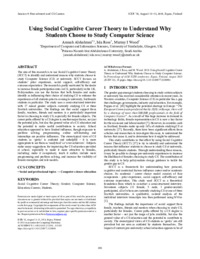Using Social Cognitive Career Theory to Understand Why Students Choose to Study Computer ScienceAmnah Alshahrani, Isla Ross, Murray I. Wood
Publikationsdatum:
Zu finden in: ICER 2018 (Seite 205 bis 214), 2018
|
 |
 Diese Seite wurde seit 1 Jahr inhaltlich nicht mehr aktualisiert.
Unter Umständen ist sie nicht mehr aktuell.
Diese Seite wurde seit 1 Jahr inhaltlich nicht mehr aktualisiert.
Unter Umständen ist sie nicht mehr aktuell.
 Zusammenfassungen
Zusammenfassungen
The aim of this research is to use Social Cognitive Career Theory (SCCT) to identify and understand reasons why students choose to study Computer Science (CS) at university. SCCT focuses on students' prior experience, social support, self-efficacy and outcome expectation. The research is partly motivated by the desire to increase female participation rates in CS, particularly in the UK. Policymakers can use the factors that both females and males identify as influencing their choice of studying CS to enhance the experiences of all students prior to coming to university, but female students in particular. The study uses a semi-structured interview with 17 mixed gender subjects currently studying CS at three Scottish universities. The findings are that social support from family, teachers, friends and mentors is a particularly important factor in choosing to study CS, especially for female subjects. The career paths offered by a CS degree is another major factor, not just the potential jobs, but also the general value of a CS education and the potential to make useful contributions to society. School education appeared to have limited influence, though exposure to problem solving, programming, online self-learning and internships are positive influences. The stereotypical view of CS students as 'geeks' is outdated and unhelpful - it is more appropriate to see them as 'analytical' or 'over-achievers'. Subjects make many suggestions for improving the CS education provided at school, especially to make it more attractive to females, including: make it compulsory, teach it earlier, include more programming and problem solving, and increase the visibility of female exemplars and role models.
 Dieses Konferenz-Paper erwähnt ...
Dieses Konferenz-Paper erwähnt ...
 Personen KB IB clear | Albert Bandura | ||||||||||||||||||
 Begriffe KB IB clear |  Geek Geek Geek
, GenderGender
, Geek
, GenderGender
,  Gesellschaft Gesellschaft society
, Informatikcomputer science
, society
, Informatikcomputer science
,  Programmieren Programmieren programming
, programming
,  Schule Schule school
, Selbstwirksamkeitself efficacy school
, Selbstwirksamkeitself efficacy
| ||||||||||||||||||
 Bücher |
|
 Dieses Konferenz-Paper erwähnt vermutlich nicht ...
Dieses Konferenz-Paper erwähnt vermutlich nicht ... 
 Nicht erwähnte Begriffe | Bildung, Digitalisierung, Informatik-Didaktik, Informatik-Unterricht (Fachinformatik), LehrerIn, Unterricht |
 Tagcloud
Tagcloud
 Zitationsgraph (Beta-Test mit vis.js)
Zitationsgraph (Beta-Test mit vis.js)
 Anderswo finden
Anderswo finden
 Volltext dieses Dokuments
Volltext dieses Dokuments
 |  Using Social Cognitive Career Theory to Understand Why Students Choose to Study Computer Science: Fulltext at the ACM Digital Library ( Using Social Cognitive Career Theory to Understand Why Students Choose to Study Computer Science: Fulltext at the ACM Digital Library ( : :  , 866 kByte; , 866 kByte;  : :  2020-11-28) 2020-11-28) |
 Anderswo suchen
Anderswo suchen 
 Beat und dieses Konferenz-Paper
Beat und dieses Konferenz-Paper
Beat hat Dieses Konferenz-Paper während seiner Zeit am Institut für Medien und Schule (IMS) ins Biblionetz aufgenommen. Beat besitzt kein physisches, aber ein digitales Exemplar. Eine digitale Version ist auf dem Internet verfügbar (s.o.). Aufgrund der wenigen Einträge im Biblionetz scheint er es nicht wirklich gelesen zu haben. Es gibt bisher auch nur wenige Objekte im Biblionetz, die dieses Werk zitieren.








 Biblionetz-History
Biblionetz-History